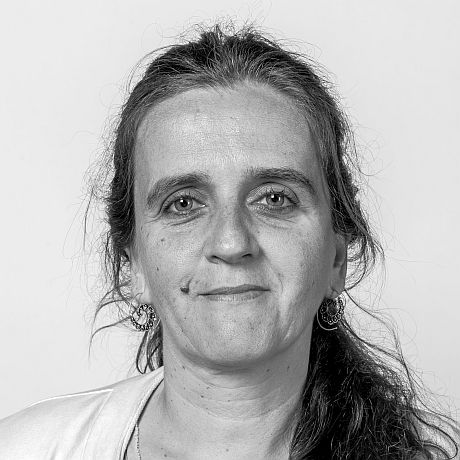The new city emerging: a public health perspective
- Dossier
- May 20
- 11 mins
The spring of 2020 will be remembered as the spring of Covid-19, a time that has forced us to stop, to take preventive measures and to live alone in a connected world. The lockdown has changed the pace of life in the city and has brought to light the bare essentials: caring for people and supporting life.
There are many newspaper articles these days that point to the importance of essential jobs, affording visibility and value to work that has been hidden for too long. Later on I will talk about the changes that the city is undergoing, which are reversing and making us revise our priorities. Before that, however, I must raise a number of general issues surrounding Covid-19 and its impact on our city from the perspective and the lessons learned of public health workers.
Firstly, we need to keep in mind the social and environmental factors that influence the health status of the population.[1] To talk about the good or poor health of the population, we must identify the determining factors, because place of residence, gender or profession can bear an impact on their state of health.[2] Early findings on the impact of Covid-19 on the city reveal that the impact of the disease follows patterns of inequality. The Barcelona Public Health Agency (ASPB) has been monitoring the impact of Covid-19 in the city and, on 8 April, launched a website where the city’s daily figures can be viewed. This information shows that between 13 March and 16 April, there were 9,311 positive cases of Covid-19 in Barcelona, with a greater incidence among the elderly and a greater impact in certain areas of the city. It should be noted that these statistics correspond to the most serious cases of the disease, as diagnostic tests cannot be performed on everyone. The ASPB also provides data on the burials of Barcelona residents. Between 1 March and 9 April, there were 3,758 deaths, a much higher figure than the 1,603 expected in this period (according to figures from the last ten years). This variation represents an excess mortality of 2,155 deaths, of which more than 80% affects people over 75 years of age. The figures also indicate the presence of territorial differences in the incidence of the disease, with a greater impact on the most vulnerable neighbourhoods. Covid-19 is bearing a greater impact on areas with worse socio-economic indicators, where people’s occupations are more manual, more essential and less “teleworkable”, or where the flats are smaller and present a poorer capacity for self-isolation in good conditions. Health and living conditions are two sides of the same coin.
Secondly, the spread of this global pandemic has brought to light the precariousness and weaknesses of the Western world. We thought that these effects were far-off phenomena that could in no way alter our everyday lives. In contrast, in a globalised, densely populated, highly urbanised and predatory world, it is not so difficult to imagine that vectors of transmission are on the rise and that pandemics and the transmission of rare diseases are wholly possible.[3] Just as we will undoubtedly not be oblivious to a deterioration of health if we are unable to curb climate change. Perhaps now more than ever the importance of caring for health as a collective rather than an individual element has been noted, and this aspect has a lot to do with how we think, plan and sustain life in the city.
[1] See the reports and monographic reports of the Spanish Association of Public Health and Health Administration (SESPAS) that thoroughly explain the importance of public health.
[2] In Catalonia, Carme Borrell, from the Barcelona Public Health Agency, and Joan Benach, a public health specialist at Pompeu Fabra University, have contributed scientific knowledge in this regard.
[3] The notes on this debate published by Josep Terrades on the website of the Centre for Ecological Research and Forestry Applications (CREAF) “Indispensables, de vegades letals. Els microbis, els virus i nosaltres” [Indispensable, Sometimes Lethal. Microbes, Viruses and Us].
The restrictions imposed by the state of alarm since 10 March 2020 have led to many changes and we will need a great deal of time to assess their impact.
Some issues that are emerging
From the point of view of government policy and the experience of managing a city council such as that of Barcelona, Covid-19, above all, has confronted us with the management of a health crisis. Isolating to prevent its spread, flattening the curve of new cases and intervening from the public sector to stop the health system from collapsing have been priorities throughout this process. It is for this reason that the characteristics of the lockdown have been so exceptional, with home quarantine and a halt to all non-essential activity. The restrictions imposed by the state of alarm since 10 March 2020 have led to many changes and we will need a great deal of time to assess their impact; they have also raised major debates, boundaries and contradictions about the world in which we live. The shutdown has revealed the serious deficiencies and inequalities in our social, production and healthcare model. With the lockdown, the harshness of loneliness and the day-to-day management of our own care and the people we care for, and the value of the common good and what is public and collective, have become evident. In two months, the city has changed and so have the government priorities and actions, which have been redirected to tackle the impact of Covid-19 in Barcelona. It goes without saying that all these changes will not be temporary. Moreover, new horizons of change are opening up that make it paramount to fundamentally rethink issues that have a direct effect on improving people’s lives.
Barcelona City Council mobilised all the available resources to deal with the health crisis, and action has been taken from the outset to prevent it from also being a social crisis. The city has prepared for this broader approach, beyond the health system, keeping in mind the life stories of its residents, the stories of precariousness, anxiety, fear and loneliness. The pandemic has forced the population to live in isolation in order to flatten the curve of contagion, and the city to shut down, which has yielded different impacts and can have long-term implications. Despite the strict conditions imposed by the declaration of the state of alarm to protect the population, different strategies have been rolled out to allow everyone in the city to go into quarantine, endeavouring at all times to ensure that basic needs are met.
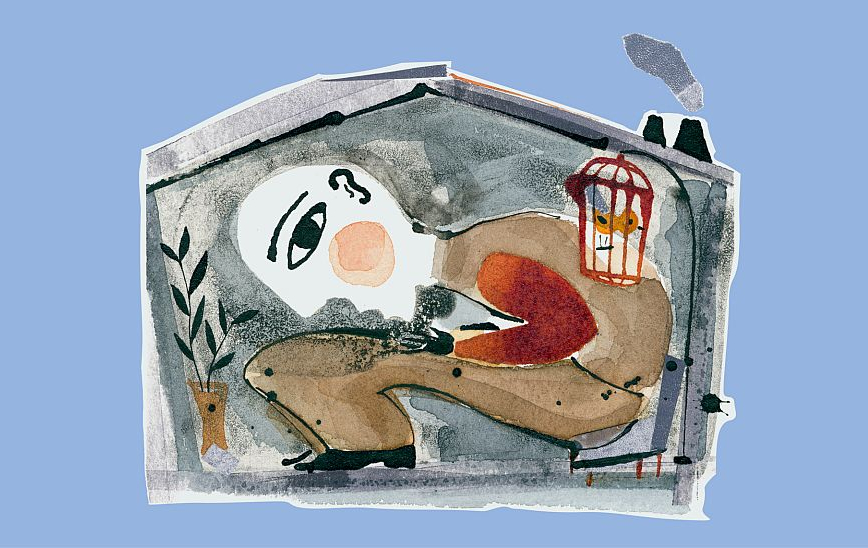 © Laura Borràs Dalmau
© Laura Borràs DalmauNever before has the fear of getting sick made us so aware of the importance of good health and the need to promote, care for and safeguard it.
A city shutdown not only means that the formal economy has slowed down – for which the State has already envisaged a mechanism whereby to protect its workers – but also that the informal economy has slowed down. The latter has borne a profound impact on the lives of many people who lived precariously within informality. Here are some noteworthy figures: Barcelona provided for an additional 714 places to house homeless people during the lockdown; the total number of meal initiatives in the city has risen by 113% (home-delivered meals, accompanied meals and soup kitchens); and social service centres have served in one month and a half 28% of the total number of people served in an entire year, more than 15% of whom were new users or who have not attended a social service centre for more than a year. The collection of rent for municipal public housing from 12,000 families has been stopped and an attempt has been made to alleviate loneliness by strengthening programmes aimed at the elderly with no company, such as telecare, the Radars programme and the Vincles initiative.
Beyond the actions undertaken to address the social emergency in the city, we must pause to consider what has become the burning issue at hand and that will have to be the basis for rethinking, in terms of health, a post-Covid-19 city.
1. Health as an integral part of people’s lives
The impact of Covid-19 has made us aware of our vulnerabilities, both physical — as regards suffering from the disease — and emotional — surviving a process of isolation that heightens the feeling of loneliness and anxiety. Never before has the fear of getting sick made us so aware of the importance of good health and the need to promote, care for and safeguard it. Times will come when we must continue to observe public health guidelines to prevent contagion, and we must certainly keep applying distancing measures, which under no circumstances should lead to the total isolation of vulnerable people and groups. It will be time to strengthen health and community health promotion programmes, and to put primary care in its rightful, central place.
The public model of residential care for the elderly will need to be revised, having ascertained that it calls for profound change to assist and care for the elderly in good conditions.
2. Social inequalities and their impact on health
We said that the impact of Covid-19 has been wider in the city’s most vulnerable areas where some or several of these factors occur: more manual, caregiving and essential service types of work; the sort of housing, which makes it difficult to adhere to home quarantine guidelines and that poses a greater risk to curb it; or areas with a more elderly population. All are factors that have had a clear impact on the incidence of the disease. Public health analyses have long alerted us to inequalities and their impact on health. It is time to put measures in place such as the minimum income recently announced by the State Government, as well as to change the regulatory framework for existing housing policies or immigration laws, without underestimating the need for a new labour policy framework to build a less unequal labour market. From the city we will have to accompany the changes with local social service policies that prioritise and restructure Barcelona’s new needs.
3. Care as an essential part of life
We said at the beginning that the importance of caregiving in all its facets has become more evident than ever. Family workers, those in teams in the public sphere, those working in homeless facilities, nurses, cleaners... they are all holding up the city. Caregiving is essential for life, although caregiving professions and caregiving spaces are not always the most well-regarded, recognised or valued. Perhaps an extreme example is what we are seeing in nursing homes, which illustrates how caring for the most dependent people is a poorly resolved situation in this ageing society.
The importance of this service has also become apparent through the debate over the timing and duration of continued care. The debate over raising and educating children during the lockdown surely conceals many debates in one, and not just the concern of families over the children’s learning. It also opened the can of worms and revealed that current work-family reconciliation policies provide an insufficient response to parents’ needs to care for children, whether they are teleworking or have to go to work in person. It starts the debate on how to deal with the easing of the lockdown measures in phases without taking into account that we must make it compatible with the day-to-day care of dependants. It may be a good time to rethink the ways we organise ourselves socially and the time (and values) we devote to them.
4. The community
Over these months we have also been able to observe how residents have rallied together, generating mutual support networks to help each other in everyday matters such as going shopping or throwing out the rubbish in times of lockdown, keeping each other company by phone or connecting to the available public services to deal with the emergency. Lovely stories are emerging that are reinforcing life among neighbourhood communities and that make life in the city friendlier and more connected. Barcelona is a rich city in terms of its social fabric, which has facilitated self-management in the midst of the Covid-19 crisis, and people may have joined who were not organised before the crisis. It is a unique experience and one that will have to play a significant role in the future of the city in the wake of the pandemic.
All of this forces us to rethink many things, including the organisation of the city. New projects need to be designed that make caregiving an integral part, such as care superblocks, which will have to combine a different city pace with an essential role played by public services and a strong and caring community. Anything that has been found not to work must be overhauled and priority must be given to what is most essential, from rethinking public health policies – while advocating the government’s reinforcement of our healthcare system – to giving importance to primary care. The public model of residential care for the elderly will need to be revised, having ascertained that it calls for profound change to assist and care for the elderly in good conditions. And new social, economic and housing policies that ensure a decent life in the city must be championed. From the municipalities we must push to generate new frameworks that allow us to move towards socially just cities. And we must do so with the help of local politicians who are committed to a city with a more relaxed pace and a public space that allows for a healthier and more humane life.
Recommended publications
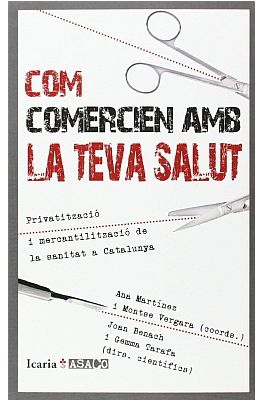 Com comercien amb la teva salut. Privatització i mercantilització de la sanitat a CatalunyaGemma Tarafa et al. Icaria, 2014
Com comercien amb la teva salut. Privatització i mercantilització de la sanitat a CatalunyaGemma Tarafa et al. Icaria, 2014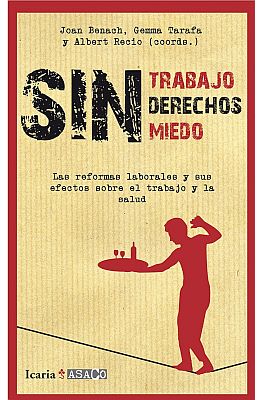 Sin trabajo, sin derechos, sin miedos. Las reformas laborales y sus efectos sobre el trabajo y la saludGemma Tarafa et al. Icaria, 2014
Sin trabajo, sin derechos, sin miedos. Las reformas laborales y sus efectos sobre el trabajo y la saludGemma Tarafa et al. Icaria, 2014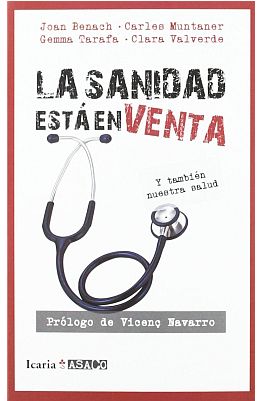 La sanidad está en venta. Y también nuestra saludGemma Tarafa et al. Icaria, 2012
La sanidad está en venta. Y también nuestra saludGemma Tarafa et al. Icaria, 2012
The newsletter
Subscribe to our newsletter to keep up to date with Barcelona Metròpolis' new developments



